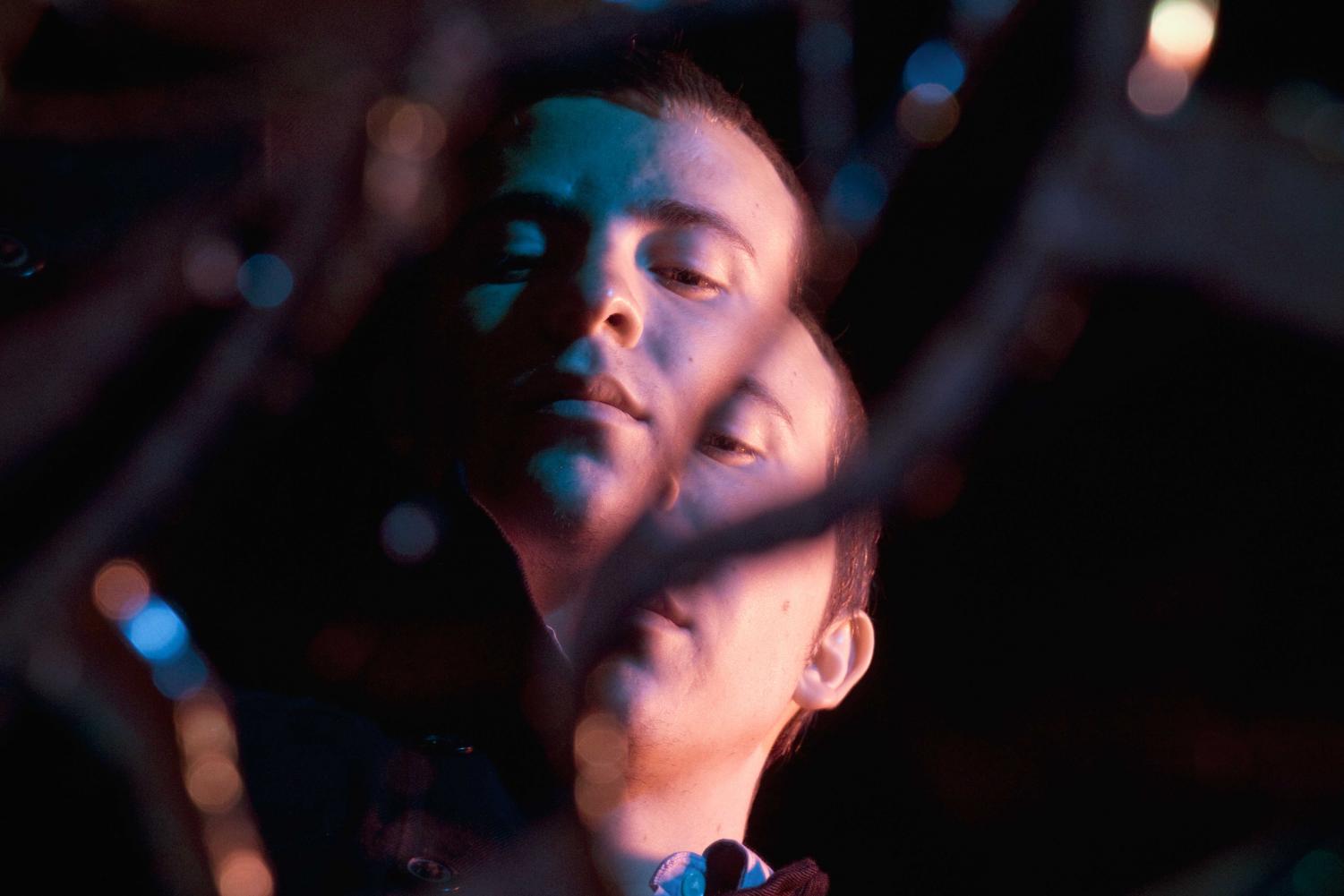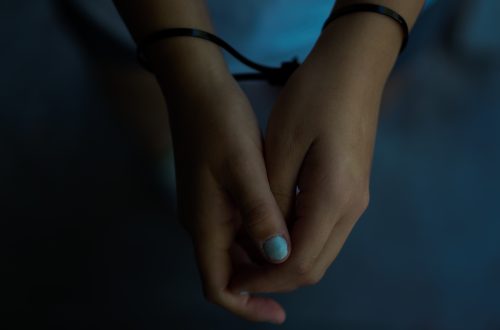Defining Porn from The Point on Vimeo.
Pornography is all the rage. That’s what Roxxanne Bliss, a bold, blonde 29-year-old adult film star says.
“Everybody does this,” she remarked at the 2009 AdultCon Expo in Los Angeles. As an escort, Bliss claims she has seen every sort of customer “under the sun” — including the Amish and a few rabbis. Bliss, who began her career with dancing at age 10 and practicing striptease by age 14, has now spent almost a decade in the porn industry.
Resident Director (R.D.) of Hart Hall Ryan Low, 36, saw his first Playboy magazine at age 7.
Low struggled with pornography for years, but now lives free from it. Bliss, on the other hand, fosters hopes of getting deeper into the industry. She has tried to get out, but says she always goes back.
“I’m a sexual addict,” she admitted blatantly. “I don’t know when to quit.”
Some students at Biola know precisely what Bliss is talking about. Pornography has consumed their lives to the point where they can’t — and don’t — imagine a day without it. Life at Biola does not guarantee an escape from sex-soaked America, after all. Sexual images emerge by the thousands from the music we listen to, the movies we watch, the books and magazines we read and the lingo we use every day.
Surrounded by so many images, identifying what is pornographic can be difficult. The word “pornography” has Greek roots and originally meant “to write about prostitutes.” Today, the public understands pornography as any depiction of erotic behavior — pictures or writing — intended to cause sexual arousal.
Psychology professor Gary Strauss says pornography fits into the “larger category of erotica, which is basically all depictions of sexuality: verbally, orally and visually.”
Like Low and Bliss, cinema professor John Schmidt was also exposed to pornography at a young age. In 7th grade, he recalls hiding in his friend’s attic to peruse a collection of Playboys.
“I remember my mom coming to pick me up and honking the horn, and it freaked me out, and I just rushed down there and hoped that I looked normal,” he says.
Schmidt suggests that pornography’s influence has recently intensified in our culture, as television and especially the Internet provide people with privacy and unending choices as to how, where and when they access content.
Child exposure to pornography has skyrocketed since the rise of the Internet. Ninety percent of children ages 8 to 5 have seen porn online and 80 percent of 15 to 17-year-olds have had multiple exposures to hardcore porn online, according to Top Ten Reviews Online. Those who encountered pornography at a young age are not alone. In fact, they are among the majority.
A man
Sophomore Jose Palos “grew up around pornography.” As a child, his only role models were ungodly men.
“There’s a sense of comfort and satisfaction you get,” Palos says, recalling his experience with porn. “It’s deep; it involves imagination. It’s kind of like worship. You engage with your mind, your body, your emotions and your soul.”
Palos, 28, has now been free from pornography for more than five years. He became a Christian nine years ago, but continued in his struggle even after his conversion. He finally recognized that the desire to view pornography was primarily lust that stemmed from the heart and mind. Palos was freed from the bondage of pornography when he cried out to God and brought his struggle out into the open.
“Jesus gets all the glory. He loves to be the healer,” Palos says. “He loves to be taken into those messy places.”
Palos said God worked especially through the people in his life who prayed for him and kept him accountable. The shame began ebbing away as he developed deeper relationships with others and a real intimacy with Christ.
“You have to die; you have to kill the flesh,” Palos says. “It gets better. It’s hard, super hard. I tossed away my movies, magazines, whatever. I was still feeling lust, still masturbating. [But] I was just desperate for the Lord.”
Palos says he just tried to be real with God, telling Him how badly he wanted to get out of porn.
“There’s no easy way out,” Palos says. “But you know, there’s success.”
A woman
Biola student Tracy began watching porn and masturbating at age 14 after reading increasingly sexual romance novels. Due to the especially sensitive nature in this culture of females involved in pornography, Tracy wishes to remain anonymous.
Romance novels fed Tracy’s sexual and emotional appetite throughout her teenage years. In 7th grade she bought an FBI novel from the school’s book fair to satisfy her interest in crime stories, not knowing that it contained a love story and a sex scene. Tracy says the book was her first encounter with reading about explicit sex. After that she was hooked and continued to read similar novels, flipping through just to get to the next sex scene.
“That wasn’t enough for my sexual appetite,” Tracy remembers. “So I bought more romance novels … stuff that had sex scenes all the way through.”
Romance novels led to late night TV surfing for skin and eventually masturbation to late night porn. With her dad asleep and brothers gone, she watched whatever she wanted, always keeping her finger on the LAST button just in case anyone came in. Now, five years free from pornography, Tracy talks about porn’s effect on the individual.
“For women,” Tracy says, “I think we are addicted to romance.”
Sigma Chi R.D. Michelle Santis can attest to this being an issue for Biola women as well.
“I think there are a lot of women who struggle with fantasy; a lot are fantasizing about men in their minds,” Santis says.
Communications professor Tim Muehlhoff identifies the fantasy aspect of pornography as one of its key dangers. For men, he says, pornography presents a woman who is flawlessly beautiful, always available, and always attracted to him. A woman may find a similar draw in a celebrity or story character, like recent heartthrob Edward Cullen of the Twilight series. The same is true for a woman carrying into her marriage a fantasy built up from years of romance novels and steamy flicks. Romance novels, while not explicitly labeled pornographic, still capture their reader’s attention through sexual scenes. Regardless of the author’s intent, Tracy’s real concern is for the reader. What is the consumer’s intention? Do people pursue sexual materials for arousal and therefore, create their own porn?
“I just didn’t see sex like God sees it,” Tracy says. “I saw it the way the world sees it, and I loved it, but I hated that I loved it, so I hid it.”
Tracy remembers crying out to God. “I want to stop,” she begged, but anytime she turned on the TV, the temptation got to her. Now, she is five years free. Tracy says she doesn’t watch much TV anymore or flip through magazines because it just brings back bad memories and temptations.
“I hate how you’re not allowed to talk about [porn],” Tracy states, frustrated. “I hate how it seems so obviously evil that if you struggle with it, you’re all of a sudden less of a man or less of a woman or less of a Christian.”
A relationship
In junior high — years after his first exposure to porn — Low started watching pornographic videos regularly with his friends, logging in hundreds of hours.
In high school, he was able to quit cold turkey after getting more involved in his youth group, but pornography reappeared in his life as easily as it had vanished. While Low was studying at Talbot School of Theology, he fell to his temptations again because he never dealt with the real issues behind his habitual consumption of sexual images, he says.
“Pornography is more about medicating something in life you’re trying to escape from,” Low says.
What tempted him to spiral back was the same magazine that started it all: Playboy. Low had stopped at a 7-Eleven on the way home from Talbot and saw the magazine sitting along with other popular titles.
“I was lonely, burnt out, and I hated myself and blamed myself because my [youth] ministry wasn’t succeeding how I wanted it to,” said Low, remembering his thoughts on the way to the convenience store.
Low justified picking up that Playboy because of the pain in his life. He says he thought to himself, just this once. But “just this once” turned into every day.
“It was a really intense, daily kind of thing,” he says, recalling the relapse with porn during his time at Talbot.
Low’s struggle went on for six months. During this time he had difficulty staying pure in his relationship with future wife Alyssa Snow, now Mrs. Ryan Low.
Low broke down and confessed his struggle after hearing God repeatedly urge him to do so on a ride home from a church event with his youth students. Soon after, Low confessed to Alyssa what he had been going through.
“I didn’t feel anything but total love and ‘I can’t believe he’s telling me this,’” Alyssa remembers. “It must’ve been such a burden to bear.”
One of the consequences pornography carried into their relationship, she says, was the heightening of her existing uncertainties about her body.
“I became very insecure,” she says. “How did he view me? I don’t look like these women at all. I won’t ever, ever look like those women.”
Alyssa distinctly remembers Ryan telling her that the women in pornography were faceless to him, unable to be hugged or held. They never offered any sort of real relationship.
“When I’m with you, confessing to you, listening to you right now when you’re crying, I’m not going to those women for an emotional connection,” he told her during one of their many open conversations. “That’s not what it was ever about. That was just an escape.”
Not only does pornography train a person to objectify others, but Low says devouring one image after another can also promote infidelity in marriage because it cripples the ability to have deep emotional relationships with someone of the opposite sex.
It has been more than 10 years since Low has looked at porn. He says he was able to realize that God was capable of saving him in an area he thought of himself as being so unlovable.
“I’ve conquered it [due] to the fact that I haven’t looked at it, it hasn’t controlled me in that way,” he says. “I can diffuse porn’s power over me. You can get yourself into a life where you don’t look at it. You can be able to move toward healing.”
After his ordeal with pornography, Low can now relate to and counsel people, especially Biola students, struggling with the issue.
“He’s been a model of God to me,” Alyssa says. “Ryan’s chosen to live in surrender of this addiction.”
Healing from the struggle
From Bliss’ perspective, “We need [pornography] in society simply for the fact that it relieves stress; it brings happiness.” Like Bliss, Low, Palos and Tracy all at one time accepted pornography as a means to an end. In the images of over-sexed women, Low found an escape from his failure and Palos found soothing from his childhood pain and emptiness. Tracy immersed herself in sexual experiences that gave her emotional and physical satisfaction.
Bible professor Erik Thoennes believes the core issue behind pornography is an unhealthy view of people and of God.
“Human beings are made in God’s image, and therefore all humans are worthy of great dignity, honor, respect and protection,” he says. “Having a sense of God’s presence and a healthy, holy fear of Him is key to overcoming this issue. Pornography objectifies humans, reducing them to mere things rather than persons to be loved.”
Low remembers how pornography skewed his view of humans in a similar way.
“When I was at the height of my porn usage it took a lot for me to look at women as more than merely breasts and vaginas,” Low says. “I think you get to a place where women become a slab of meat to you.”
To consume pornography, then, is essentially to abuse humans as sexual objects for the purpose of filling a personal need. Thoennes warns against putting band-aids on a deep wound like pornography instead of understanding the root of the problem and depending on God’s grace and power to heal. If the emptiness that originally provoked porn use is not taken care of, the problem will resurface again and again. Low found this to be true, even after a long period without pornography in high school and in his undergraduate studies.
Now, when helping Biola students who struggle with porn, Low often asks what is going on in their lives when they are most tempted to go on the Internet and search for sex. Strauss has identified four common emotional deficits — hunger, anger, loneliness, and tiredness, or “HALT” — that can lead people to self-medicate with pornography.
Accountability, as stories like Palos’ demonstrate, is key to getting out of a pornography addiction. According to Muehlhoff, accountability needs to consist of a tough love that will test how serious someone is about getting rid of pornography. There is a fight that must occur, he says, and people need to be serious about fighting for each other.
Every time people view pornography, they deaden their ability to hear the Holy Spirit, which progresses toward spiritual deafness, Muehlhoff explains.
“You lose the ability to hear the Holy Spirit in other areas of your life,” Muehlhoff says. “So, you kill yourself for the sake of pornography and you become dead spiritually. And Jesus says, ‘What do you want more, Me or pornography?’ And He’ll wait you out to see which one you want more.”
Biola students up to their shoulders in struggle and serious about turning things around can take advantage of several resources at Biola. Dean of Students Danny Paschall describes what the process may look like.
“We don’t discipline students for pornography,” he says. “That doesn’t help. We connect them with someone to talk to every week. If it’s deeper, we get them to go to counseling. This is a monster that you’ve been feeding. The more you feed it, the bigger it gets. What are you going to do to stop it?”
Paschall says that there is no formula, but that the goal is to help students individually to stop harmful behavior and change their habits. Support groups, one-on-one accountability and counseling are just a few options. Ultimately, the Christ-follower believes that it is God who convicts, empowers and restores. Bliss and millions of others in our society are not willing to say “no” to pornography. Unfortunately, some believe pornography is an ultimately satisfying answer to life’s problems and that it can heal life’s hurts and sorrows.
Low doesn’t deny the destructive nature of pornography in his life, but he sees God’s ingenious work in his life during the struggle and the distance God has taken him since then.
“This is what redemption looks like,” Low says. “And I believe God can do the same for other men and women.”





